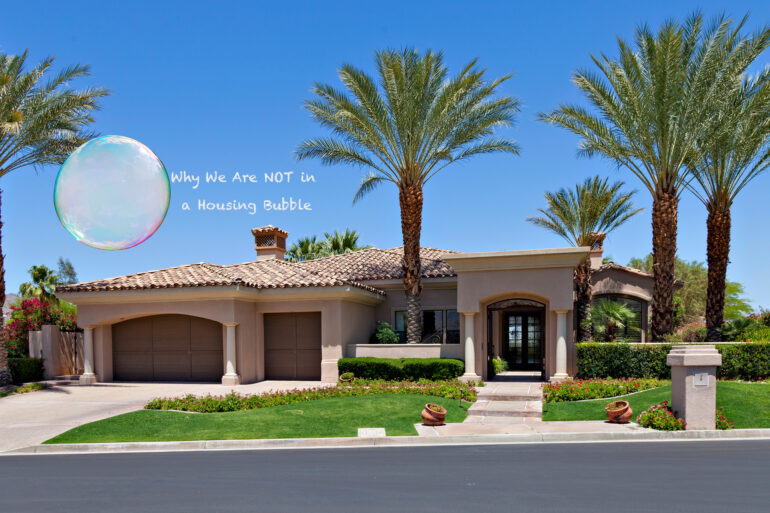Why Our Current Hot Market Is NOT a Bubble
Real estate prices have surged since the pandemic. The S&P CoreLogic Case-Shiller home price index showed a 19% jump in housing prices in 2021. The Florida Realtors’ year-end report echoed these findings, showing a 20% jump in home prices in 2021.
The pandemic didn’t jumpstart a slow real estate market. It simply added fuel to the fire. While 2021 gains were strong, they’re part of a five-year trend where housing prices increased by 69%.
Rising prices continue rising until they don’t. Some investors remember dot-com stocks losing 90% of their value after the bubble burst. More investors remember the Great Recession, an economic disaster that saw millions of homes go into foreclosure.
Housing prices leading up to the Great Recession kept rising with no signs of slowing down. The price movement leading up to the Great Recession looks similar to the current market, but there are some key differences between today’s real estate market and the early 2000’s.
What Happened During the Great Recession?
During the Great Recession, millions of people lost their homes and the stock market crashed. It took several years for the economy to recover, but some retail investors never made up their gains. These consequences have made many people fearful of the current market. Some investors are waiting on the sidelines for a crash before buying properties.
The Great Recession was several years in the making. Policy mistakes and questionable decisions from financial institutions enabled that event to occur. Lenders were incentivized to hand out as many loans as possible. Each loan represented another income stream, and the housing market felt unstoppable.
Along the way, lenders let down their guard and gave loans to practically anyone. Borrowers with poor credit could qualify for a subprime loan, which became known as NINJA loans. Lenders didn’t care if borrowers didn’t have any income, job, or assets, much like student loans.
These borrowers had no chance of repaying the loan after the introductory rates expired. Blinded by decades of prosperity, lenders didn’t see that risk. Borrowers intentionally ignored the risks or didn’t think of them. Subprime borrowers suddenly had an opportunity to capitalize on the booming real estate market.
Reality eventually set in, and borrowers with no income, job, or assets couldn’t keep up with the loan payments. These borrowers desperately tried to sell their properties before getting forced into foreclosure. As more sellers list their properties, the remaining buyers gain leverage. Buyers could get bargain prices because sellers desperately needed to get out of their loan obligations.
Wall Street managed to make the situation work by creating CDOs around these risky loans. Big banks bought up shares with leverage, giving them dangerous exposure to these dynamics. When the house of cards fell, greedy executives and big banks lost billions of dollars. The major credit bureau stamped these assets with an AAA rating, indicating these assets were the safest in the market.
Why People Fear We Are in a Real Estate Bubble
The current real estate market doesn’t have the same dynamics as the Great Recession, but some dangers suggest a possible correction. Inflation and interest rate hikes are real concerns. Investors wonder if homeowners can keep up with mortgage payments if costs continue rising.
The Consumer Price Index jumped 8.5% in March, making it the highest increase since 1981. The Fed also projected several interest rate hikes this year. Higher interest rates reduce the number of buyers looking for a home. Sellers may have to lower their prices to match decreased buyer demand.
The Fed also raised rates leading up to the Great Recession. Between June 2004 and June 2006, the interest rate jumped from 1.3% to 5.3%. Borrowers with variable loans felt the higher interest rates and couldn’t keep up with their loans.
Some homeowners may struggle with their loan payments and inflation. The real estate market may see an uptick in foreclosures as costs continue rising, but this economic environment isn’t like 2008.
The Great Recession’s Aftermath Created Vital Safeguards
The Great Recession taught investors many lessons, and regulation became stricter. Lenders could no longer get away with subprime mortgages to applicants with no income, job, or assets. Lenders are less than two decades removed from the Great Recession, making them more conscious of the risks.
To qualify for a mortgage, borrowers need sufficient credit scores, debt-to-income ratios, and other financials. These parameters result in more qualified buyers who can keep up with mortgage payments. During the Great Recession, lenders happily handed out loans, regardless of whether an applicant could pay the loan off or not. Regulators fell asleep at the helm and didn’t stop the lenders from handing out these risky loans.
If we see an uptick in foreclosures, it shouldn’t look as bad as the Great Recession. Rising interest rates won’t hurt homeowners with fixed-rate mortgages, while homeowners with variable-rate mortgages will feel the impact. The Fed raises interest rates to fight off inflation, which can help homeowners with fixed payments.
Decelerating inflation can return some control to skyrocketing prices, helping homeowners keep up with fixed-rate mortgage payments and other expenses. The current homeowner is far different from a pre-Recession homeowner who may have earned no income but owned three properties. Safeguards created in response to the Great Recession offer many protections that mitigate the risks of a repeat.
Real Estate Prices Rely on Supply and Demand
Supply and demand dictate the economy. These dynamics can cause prices to skyrocket or collapse depending on the economy’s direction. Millions of foreclosures created many opportunities, but a higher supply reduced demand.
Qualified buyers could get picky and obtain favorable terms from sellers and lenders. The Great Recession was an incredible opportunity for investors who stayed on the sidelines and capitalized on the sudden increase in supply.
Real estate demand is still strong, especially in Florida. The state saw 167% more move-ins than move-outs in 2020. The following year was also strong, with 43% more move-ins than move-outs. People from expensive states like New York, New Jersey, and California fled to Florida during the pandemic to escape higher living costs. Americans in the northeast wanted to escape the winter season and stay in sunny Florida instead.
It became less important to live in the city, and people could suddenly work remotely. Florida’s low cost of living and terrific year-round weather made people question why they were paying so much money to live in or near cities like New York City and San Francisco.
Florida’s population has been surging since the 1960s, going from five million residents to over 22 million people. New York has only added two million residents since 1970, and California’s population growth rate has slowed down substantially in recent years.
A population boom doesn’t change the supply of real estate. More buyers and the same supply lead to higher prices and bidding wars. As homeowners hold onto their properties instead of listing them on the market, available listings become more valuable. Due to inflation and the Fed’s interest rate hikes, few buyers may enter the market.
However, a low supply of real estate can offset a decrease in buyers. A population boom such as what Florida has experienced in recent years increases the pool of buyers, leaving sellers with more control over housing prices.








